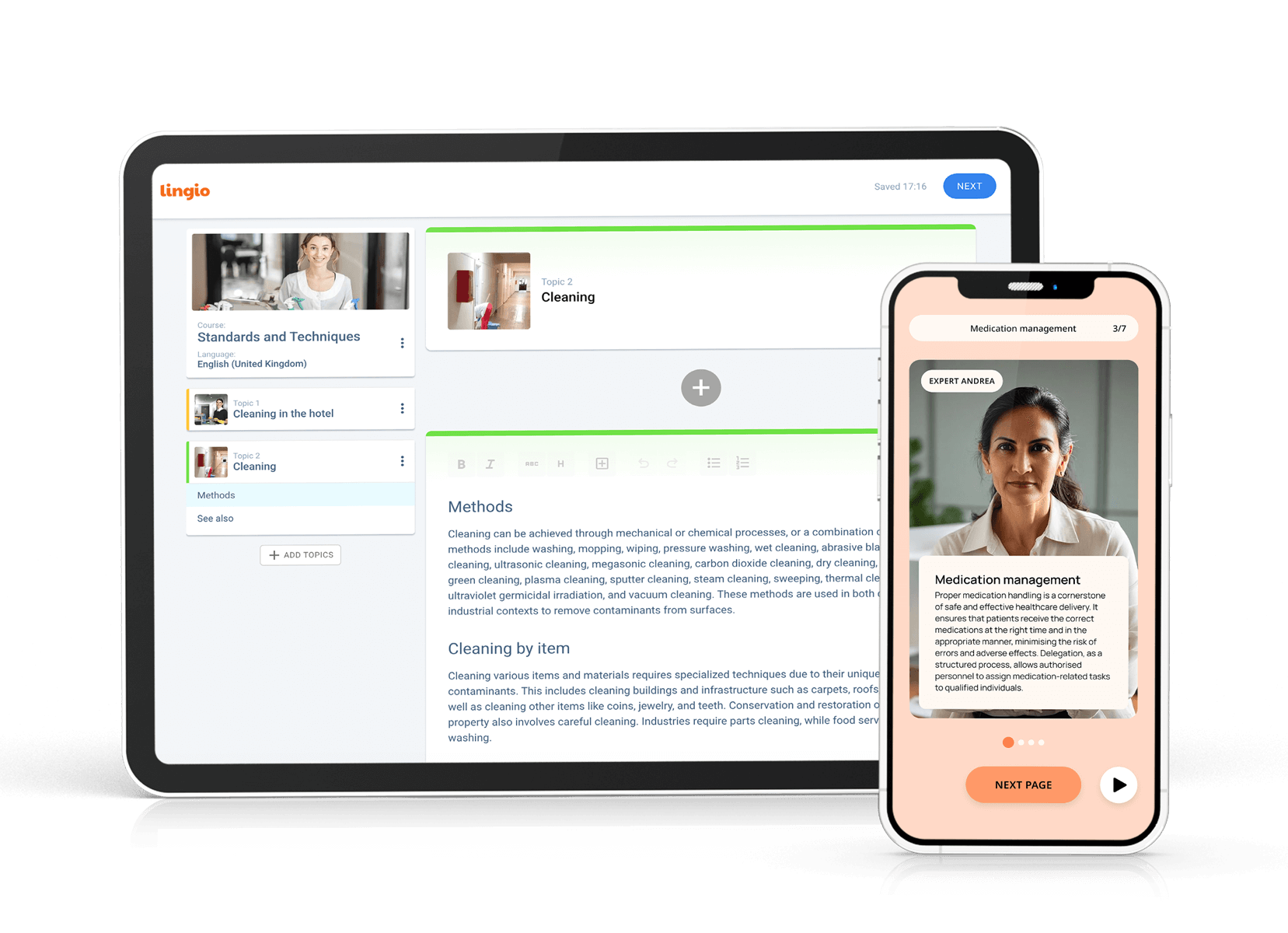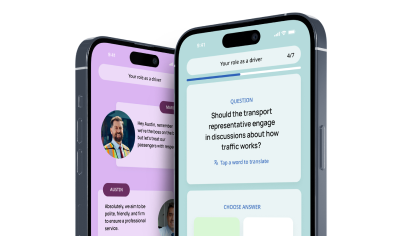The retail industry in 2025 is more dynamic than ever, shaped by digital innovation, rising customer expectations, and evolving business operations. To stay competitive, retail businesses must prioritise strategic retail staff training that not only enhances customer service skills but also drives sales performance and employee productivity. Whether you’re onboarding new hires or refining the skills of experienced sales associates, an effective retail staff training program is essential.
Retail training programs today go beyond basic product knowledge they’re key to strengthening store operations, fostering team leadership, and meeting compliance training requirements. With the right training materials, retailers can empower staff to deliver exceptional customer service, encourage customers to stay loyal, and ensure consistent business growth. In this guide, we’ll explore how to effectively train retail employees in 2025, highlighting key methods, tools, and best practices to transform your team into a well-trained workforce ready for the future.
What should you know about training retail staff?
The retail landscape has undergone significant transformations in recent years. The rise of e-commerce and technological advancements have revolutionised how customers shop. With just a few clicks, consumers can browse, purchase, and receive products faster than ever. This convenience has elevated customer expectations, putting pressure on brick-and-mortar retailers to offer exceptional in-store experiences that go far beyond simple transactions.
Recognising this shift, successful retail businesses are doubling down on their most valuable asset: their employees. A strong retail training strategy is no longer optional—it’s essential. Through well-structured, continuous retail employee training, businesses can ensure their staff consistently deliver outstanding service, adapt to changing technologies, and exceed customer expectations.
One of the foundations of effectively training retail staff is providing a deep understanding of your brand’s products and services. In today’s fast-paced retail environment, customers expect sales associates to offer not only friendliness but expertise. Well-designed product training not only boosts employee confidence, it also enhances knowledge retention, enabling retail teams to provide accurate, valuable information that builds trust and improves the overall customer experience.
T
The evolving role of retail staff in 2024
The role of retail staff has significantly transformed over the years. They are no longer just salespeople; they have become brand ambassadors, advisors, and problem solvers. In 2025, the expectations placed on retail staff will be even higher as customers demand personalised experiences and digital convenience.
To meet these expectations, retailers must invest in upskilling their staff. Traditional training methods are no longer sufficient. Instead, a holistic approach that includes technology and soft skills training for new hires is essential for success.
In the fast-paced world of retail, staying ahead of the curve is crucial. With advancements in technology and the rise of e-commerce, the role of retail staff has evolved to adapt to these changes. Today, retail staff are not just there to sell products; they are the face of the brand, representing its values and ethos.
As brand ambassadors, retail staff play a vital role in creating a positive and memorable customer shopping experience. They are knowledgeable about the products and services offered and can provide valuable insights and recommendations to customers based on their needs and preferences. In 2025, this role will become even more critical as customers expect a personalised experience tailored to their individual tastes and requirements.
Understanding modern customer expectations
Modern customers are no longer satisfied with generic, one-size-fits-all approaches. They seek personalised attention that caters to their unique needs and preferences. Whether through targeted marketing campaigns or personalised recommendations, retailers must go the extra mile to make customers feel valued and understood.
Furthermore, the rise of technology has transformed how customers interact with businesses. With smartphones, tablets, and laptops at their fingertips, consumers expect seamless omnichannel experiences. They want to be able to browse products online, make purchases in-store, and have a consistent experience across all touchpoints. Retailers must adapt to this digital landscape and ensure their training programs equip employees with the necessary skills to navigate and excel in the omnichannel world.
Ethics and sustainability have also become significant considerations for modern customers. They are more conscious of the impact their purchases have on the environment and society as a whole. Retailers must demonstrate ethical practices like fair trade, eco-friendly packaging, and supporting local communities. By incorporating these values into company policies and training programs, retailers can align themselves with the expectations of their socially responsible customers.
By understanding these expectations, retailers can tailor their training programs to address specific customer pain points and deliver exceptional experiences. Training should focus on developing active listening, empathy, problem-solving, and effective communication skills. New employees should also be educated on the company's values and mission to represent the brand in a way that resonates with modern customers.
10 Strategies for effective retail staff training in 2024
1. Focus on personalised customer service skills
In the era of automation and self-service, human interaction is becoming increasingly valuable. Retail staff should be trained to provide personalised customer service beyond basic assistance. Empathy, active listening, and problem-solving skills should be at the forefront of their training.
Regarding personalised customer service, one size does not fit all. Each customer has unique needs and preferences, and it is the responsibility of retail staff to understand and cater to these individual requirements. By focusing on personalised customer service skills, retail staff can create a memorable and enjoyable shopping experience for each customer.
Furthermore, personalised customer service is not limited to face-to-face interactions. In today's digital age, retail staff should also be trained to provide personalised service through online and social media channels. This includes responding promptly to customer inquiries, addressing concerns, and offering tailored recommendations.
2. Embrace digital tools and omnichannel strategies
The rise of e-commerce and mobile shopping means that retail staff must be well-versed in digital tools and omnichannel strategies. Training should include knowledge of online platforms, mobile payment systems, and the ability to assist customers across various channels seamlessly.
With the increasing popularity of online shopping, retail staff should be equipped with the necessary skills to navigate digital platforms and provide a seamless shopping experience. This includes understanding how to use online inventory systems, processing orders, and assisting customers with technical difficulties.
In addition to digital tools, retail staff should also be trained in omnichannel strategies. This means assisting customers who may start shopping online but visit the physical retail store for further assistance. By embracing digital tools and omnichannel strategies, retail staff can meet customers' expectations in an ever-evolving retail landscape.
3. Implement interactive product knowledge training
Retail staff should have in-depth knowledge of the products they sell. Interactive training methods such as virtual reality simulations and hands-on experiences can help them better understand the merchandise. This knowledge will enable them to answer customer queries confidently and make relevant recommendations.
Product knowledge is the backbone of effective retail staff training. By immersing themselves in interactive training materials and methods, retail staff can develop a comprehensive understanding of the products they sell. This includes knowing each item's features, benefits, and potential uses.
Interactive product knowledge training can take various forms. For example, virtual reality simulations allow retail staff to virtually explore different product categories and interact with them as if they were in a physical store. Hands-on experiences, on the other hand, can involve staff members using the products themselves, allowing them to understand their functionality and quality.
By implementing interactive product knowledge training sessions, retail staff can become trusted customer advisors, providing accurate and valuable information that enhances the shopping experience.
4. Develop Emotional Intelligence and Empathy
Emotional intelligence is a key skill for retail staff, enabling them to understand and connect with customers more deeply. Training should focus on developing empathy, active listening, and conflict resolution skills, allowing staff to navigate various customer interactions effectively.
Emotional intelligence is recognising and understanding emotions in oneself and others. In retail, emotional intelligence is crucial for building customer rapport and creating a positive shopping experience.
Training in emotional intelligence should include developing empathy, which involves putting oneself in the customer's shoes and understanding their perspective. Retail staff can establish trust and build strong relationships by actively listening to customers and acknowledging their feelings.
In addition to empathy, retail sales training should focus on conflict resolution skills. Retail staff may encounter challenging situations where customers are dissatisfied or have complaints. By remaining calm and professional and finding mutually beneficial solutions, retail staff can turn potential conflicts into opportunities for customer satisfaction.
5. Encourage upselling and cross-selling techniques
Upselling and cross-selling are valuable sales techniques used for increasing revenue. Retail staff should be trained in suggestive selling strategies consistent with customer-centric approaches. By understanding customers' needs, staff can make relevant suggestions to enhance the shopping experience.
Upselling and cross-selling techniques can benefit both the retailer and the customer. By suggesting additional products or services that complement the customer's initial purchase, retail staff can enhance the value and utility of the customer's shopping experience.
Training in upselling and cross-selling should focus on understanding customers' needs and preferences. By actively listening to customers and asking relevant questions, retail staff can identify opportunities for upselling or cross-selling. However, balancing suggestive selling and respecting the customer's choices is important.
By encouraging upselling and cross-selling techniques, retail staff can increase revenue and provide customers with a more personalised shopping experience.
6. Prioritise problem-solving and conflict resolution
In any customer-facing role, challenges are bound to arise. Retail staff should be well-equipped to handle problems and conflicts effectively. Training should focus on problem-solving techniques, active listening, and maintaining a calm and professional demeanour, even in challenging situations.
Problem-solving and conflict-resolution skills are essential for retail staff to handle various customer issues that may arise. Whether it's a product defect, a delivery delay, or a customer complaint, retail staff should be trained to address these challenges promptly and satisfactorily.
Training in problem-solving should include techniques such as root cause analysis, brainstorming solutions, and evaluating the best course of action. By using on the job training actively listening to customers' concerns and taking ownership of the problem, retail staff can demonstrate their commitment to providing excellent customer service.
In addition to problem-solving, training should also focus on maintaining a calm and professional demeanour in challenging situations. By remaining composed and empathetic, retail staff can de-escalate conflicts and find mutually beneficial resolutions.
7. Integrate sustainability and ethical practices
With increasing environmental awareness, customers expect retailers to prioritise sustainability and ethical practices. Retail staff should be trained to communicate the brand's values and educate customers about sustainable options. This training will enable staff to engage with customers and authentically contribute to a greener future.
Sustainability and ethical practices have become significant considerations for many customers when purchasing. Retail staff should be knowledgeable about the brand's sustainability initiatives and be able to communicate them effectively to customers.
Training for retail employees in sustainability and ethical practices should include educating retail staff about the environmental impact of certain products and the benefits of choosing sustainable alternatives. Retail staff can empower customers to make more environmentally conscious choices by providing information and options.
Furthermore, retail staff should be trained to lead by example and incorporate sustainable practices into daily routines. This can include reducing waste, conserving energy, and promoting recycling initiatives.
8. Cultivate teamwork and collaborative skills
Collaboration and teamwork are vital in a retail environment. Staff should be trained to work seamlessly with their colleagues, fostering a positive and supportive team culture. This training can include team-building exercises, communication workshops, sales training, and cross-department collaborations.
Effective teamwork and collaboration are essential for smooth operations and customer satisfaction in a fast-paced retail environment. Retail staff should be trained to communicate and collaborate with their colleagues, regardless of their roles or departments.
Training in teamwork and collaboration can include team-building exercises that promote trust, communication workshops that enhance interpersonal skills, and cross-department collaborations that foster a sense of unity and shared purpose.
By cultivating teamwork and collaborative skills, retail staff can create a harmonious work environment that translates into exceptional customer service and increased productivity.
9. Offer continuous learning and development opportunities
Staff training should be an ongoing process to stay ahead in the retail industry. Retailers should invest in continuous learning and development opportunities for their employees. This training method can include workshops, seminars, industry certifications, and access to online training platforms.
In a rapidly evolving retail landscape, retail staff needs to stay updated with the latest industry trends, technologies, and customer preferences. Retailers should provide continuous learning and development opportunities to ensure their staff remains knowledgeable and adaptable.
Continuous learning and development can take various forms, such as workshops and seminars conducted by industry experts, certifications that validate specific skills or knowledge, and access to online training platforms that offer a wide range of courses.
10. Measure training effectiveness and adapt
Retailers should establish key performance indicators (KPIs) and regularly evaluate the impact of their training initiatives. This feedback can be used to refine the training program and address any gaps or areas of improvement.
Measuring the effectiveness of training programs is crucial to ensure they achieve the desired outcomes. Retailers should establish KPIs that align with their training objectives and regularly evaluate the performance of their retail training staff against these indicators.
Feedback from retail staff and customers can also provide valuable insights into the effectiveness of employee training programs and initiatives. By collecting feedback through surveys, focus groups, or one-on-one discussions, retailers can identify gaps or areas of improvement in their training programs.
Based on the feedback received, retailers should be willing to adapt and refine their own training courses and programs to meet the needs of their retail staff and customers.
Final thoughts
As we navigate the transformative landscape of the retail industry, the significance of equipping our staff with the necessary skills and knowledge becomes undeniably clear. Embracing the strategies outlined in this article will enhance customer satisfaction and propel business growth to new heights.
In this endeavour, tools like Lingio can play a pivotal role in revolutionising how we approach retail staff training. Lingio's innovative learning solutions are designed to meet the dynamic needs of today's retail environment, making retail employee training more accessible, engaging, and effective. Integrating Lingio into your training strategy ensures that your team is prepared and excited to deliver exceptional customer experiences. Let's leverage these insights and the power of Lingio to transform our retail staff into the brand ambassadors of tomorrow, ready to meet the evolving demands of our customers and drive our businesses forward in 2025 and beyond.

Frequently Asked Questions (FAQs)
1. Is it necessary to invest in technology for retail staff training?
Yes, investing in technology is essential for modern retail staff training. Digital tools, virtual reality simulations, and interactive e-learning platforms like Lingio can greatly enhance the training experience and better prepare staff for customer interactions.
2. How often should retail staff training be conducted?
Retail staff training should be an ongoing process. Continuous learning and development opportunities should be provided to keep staff updated with the latest industry trends and customer expectations.
3. How can retail staff training help drive business growth?
Exceptional customer experiences are key to gaining customer loyalty and generating positive word-of-mouth. Well-trained retail staff can provide personalised service, increase sales through upselling techniques, and contribute to creating a positive brand image.
4. What are the benefits of incorporating sustainability training for retail staff?
Sustainability training helps retail staff understand the impact of their actions on the environment and educate customers about sustainable options. By incorporating sustainability practices, retailers can align with customers' values and differentiate themselves in the market.
5. How can retailers measure the effectiveness of their training programs?
Retailers can measure training effectiveness through customer feedback, sales performance indicators, and staff assessments. Regular evaluation and feedback loops will help identify areas for improvement and ensure that the training program remains effective.
Remember, investing in retail staff training is an investment in the long-term success of your business. By equipping your team with the necessary skills and knowledge, you can create memorable customer experiences and stand out in a competitive market. So, embark on this training journey and watch your business thrive in 2025 and beyond!


Table of contents
Intro
What should you know about training retail staff?
The evolving role of retail staff in 2024
Understanding modern customer expectations
10 Strategies for effective retail staff training in 2024
Final thoughts
Frequently asked questions (FAQs)


